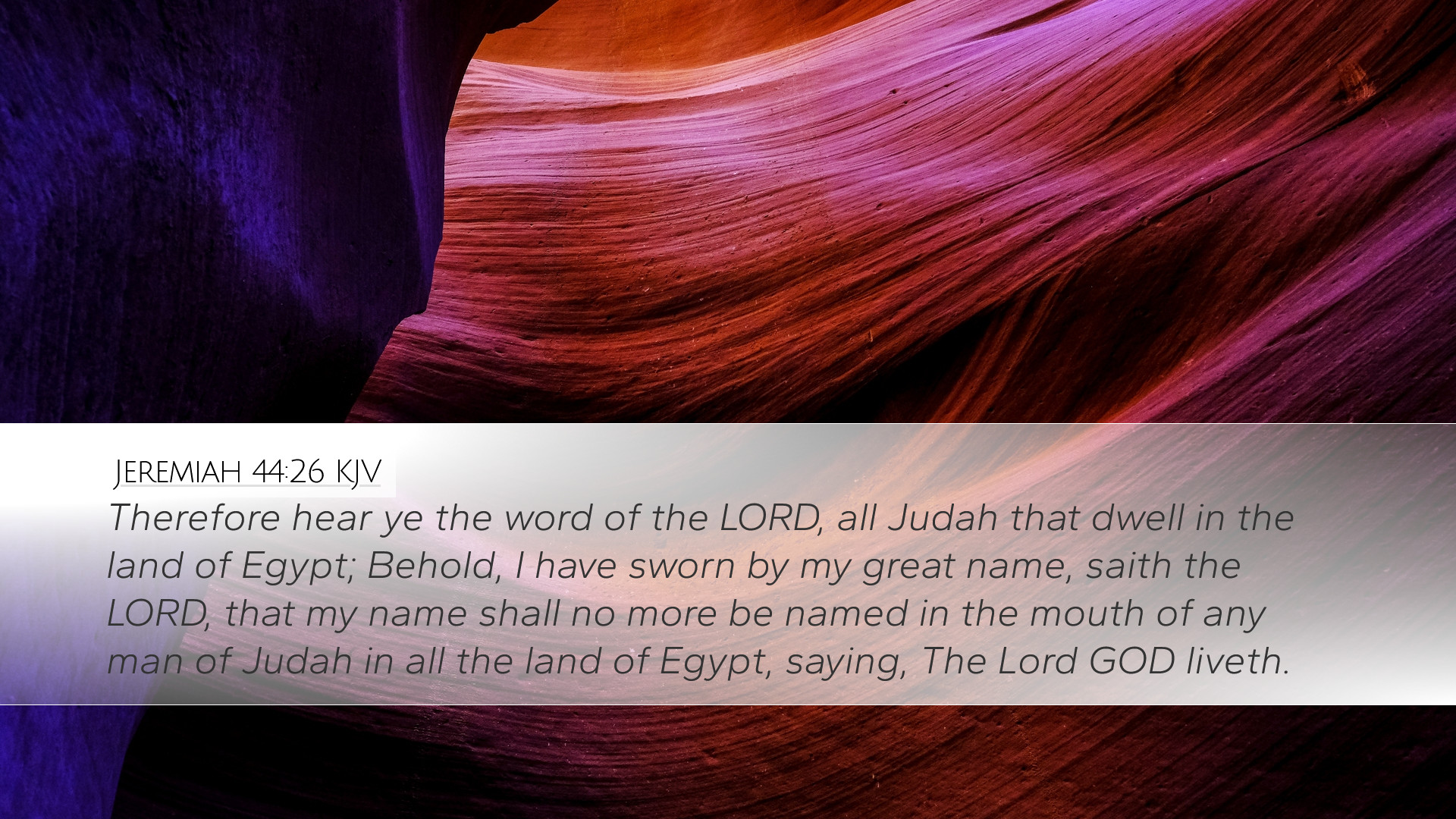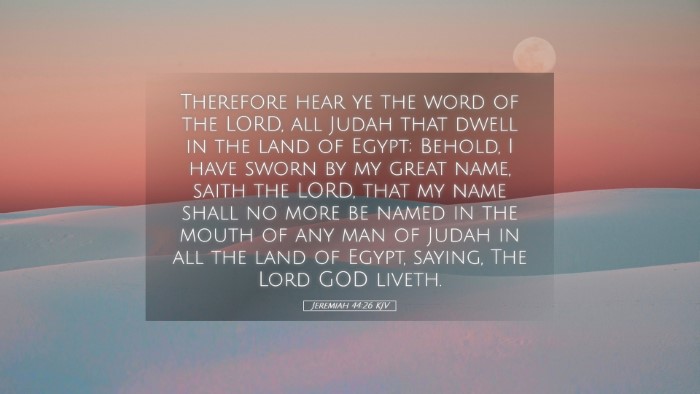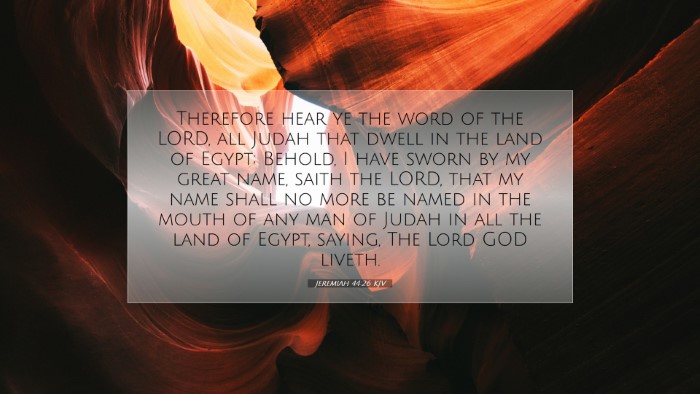Commentary on Jeremiah 44:26
In Jeremiah 44:26, the Lord issues a solemn declaration regarding the fate of those who persist in worshiping false gods. This passage serves not only as a warning but also as a profound insight into the relationship between divine justice and human actions. In this commentary, we will explore the rich insights derived from public domain commentaries, providing a coherent understanding of this pivotal verse.
Contextual Background
To fully appreciate the significance of Jeremiah 44:26, it is essential to consider the context in which it was written. The Book of Jeremiah is situated during a tumultuous time in the history of Israel, marked by impending judgment due to rampant idolatry and disobedience to God. Jeremiah, the prophet, is often referred to as the "weeping prophet," as he bore the burden of God's messages in a time when the people were largely unresponsive.
Text of Jeremiah 44:26
“Therefore hear ye the word of the LORD, all Judah that dwell in the land of Egypt; Behold, I have sworn by my great name, saith the LORD, that my name shall no more be named in the mouth of any man of Judah in all the land of Egypt.”
Exegesis of the Verse
Jeremiah 44:26 serves as a pivotal pronouncement wherein God reiterates His commitment to uphold His just character while warning the people of Judah residing in Egypt. Let's delve into some key components of this verse:
- The Call to Attention: The phrase "hear ye the word of the LORD" underscores God’s desire for His people to listen and heed His word. This is a recurring theme throughout the book of Jeremiah, emphasizing the necessity of receiving divine instruction.
- The Divine Oath: God's declaration of having "sworn by my great name" signifies the gravity and authority behind His words. The use of God's name is a powerful tool employed by the prophet to stress the seriousness of the impending consequences for the continuous idolatry of His people.
- The Ban on His Name: The promise that God's name "shall no more be named in the mouth of any man of Judah" signifies a complete separation between God and His unfaithful people. This separation punctuates the consequences of persistent rebellion against God, marking a decisive shift in their relationship with Him.
Theological Insights
This verse encapsulates several theological themes that merit deeper examination:
- Divine Judgement: The context of judgment permeates not only this verse but the entirety of Jeremiah's prophecies. God’s judgment is not arbitrary but a response to the unrepentant behavior of His people.
- The Importance of Obedience: Overall, the continuous exhortation for Judah to obey highlights a pivotal theological principle: obedience to God is paramount for communion with Him. Their failure exemplified in this verse leads to tragic consequences.
- The Nature of God’s Promises: This verse also raises questions about God's promises. When Israel turned from Him, they created conditions where God had to fulfill the judgment component of His covenant—demonstrating that God's promises contain both blessings and curses contingent upon obedience.
Insights from Public Domain Commentaries
Matthew Henry
Henry notes that this verse illustrates God’s fierce displeasure with idolaters who defy His commandments. He emphasizes that despite the people's attempts to negotiate or justify their actions, God's word stands unyielding. Henry urges believers to realize the weight of their words and associations, as invoking God’s name frivolously can lead to dire consequences.
Albert Barnes
Barnes elaborates on the significance of God's swearing by His name, indicating that this not only reinforces the solemnity of divine judgment but also reflects God's unwavering holiness. He argues that the people’s failure to heed this warning leads to a spiritual void where God's presence is withdrawn, indicating a grievous loss for His people.
Adam Clarke
Clarke comments on the historical implications of Judah’s relocation to Egypt, suggesting that their idolatry followed them into exile. He highlights the grave danger of compromising faith through cultural assimilation, whereby the people become entrenched in practices that are both foreign and contrary to their covenant with God.
Application for Modern Believers
The lessons from Jeremiah 44:26 remain relevant for contemporary Christians. In an age where many are drawn to distraction and idolatry, the call to recognize God's sovereignty and the seriousness of His words cannot be overlooked. Here are some application points:
- Heed the Word of God: Pastors and theologians must continue to emphasize the importance of listening to and acting upon Scripture, as neglecting God’s call can lead to spiritual decay and judgment.
- Recognize the Weight of God’s Name: Believers must be cautious in how they invoke God's name—valuing it and understanding the implications of living a life that reflects His character.
- Embrace Obedience: The importance of obedience in a believer's life is underscored. Disobedience leads to estrangement from God, while faithful living fosters a closer relationship with Him.
Conclusion
Jeremiah 44:26 is a compelling reminder of the necessity to uphold our covenant with God through faithful living and obedience. As we reflect on the insights gleaned from historical commentaries, it becomes clear that the implications of this warning extend beyond the ancient world, speaking profoundly to the hearts of modern believers and leaders. The divine call remains—hear and heed the words of the Lord!


